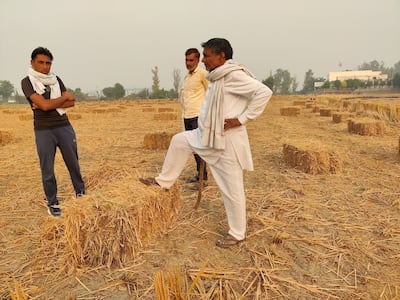Farmer Mahender Jagmal is unconcerned by the plumes of grey smoke rising from his farm, a regular sight amid a widespread winter agricultural practice blamed for stoking Delhi’s annual air pollution crisis.
The 57-year-old farmer from Haryana state’s Jind district, about 125 kilometres from the Indian capital, is among tens of thousands of farmers across large parts of northern India who resort to scorching the earth to remove crop stubble.
“What else can we do? The time was running out and I had to clear the stubble … burning is easy and quick,” Mr Jagmal told The National, in reference to the coming sowing season.
For decades, Delhi has suffered the scourge of toxic air caused by emissions from vehicles, factories and dust from construction and roads. The problem persists throughout the year, but pollution creeps to catastrophic levels towards the end of October.
Winds carry the toxic smoke to the city of 21 million from the faraway farmlands of Haryana and Punjab. There, the average farmer illegally burns more than 20 million tonnes of paddy stubble in October and November, according to a study by the International Maize and Wheat Improvement Centre, a non-profit agricultural research centre.
The acrid, eye-stinging smoke is then trapped over Delhi as temperatures plummet and air moisture rises to create a thick layer of putrid yellow smog, an apocalyptic scene that is repeated each year.
Since the start of November, farm fire smoke has contributed up to 40 per cent of the city’s air pollution, pushing pollution levels to the “severe” category which experts say is harmful even to healthy people.

On Saturday, the authorities closed schools for a week and asked employees to work from home to decrease transport use after the country’s top court demanded action to reduce pollution.
The Supreme Court proposed a total lockdown in the city to clean up the air after a weeks-long rise of the most harmful tiny particulate matter, PM 2.5, which hovered around 300, almost 10 times higher than the World Health Organisation’s safe limit of 25.
Causing high levels of air pollution has been illegal in India since 1981, but the widespread practice of farm fires was banned in 2015 by an environmental court after pollution levels soared in Delhi, ranked as the most polluted capital in the world.
Across the twin bread-basket states of Punjab and Haryana, farmers say the annual paddy-wheat crop cycle leaves them with little time to clear harvest residue.
They employ the fastest and cheapest method of burning the stubble, which protrudes from the soil as harvester machines cannot clear it.
Farmers say they have to spend extra money to remove the crop residue by employing manual labourers or expensive new equipment, leaving them to fall back on the crude but low-cost method.
More than 50,000 farm fires have been reported in the region since November 1, according to the National Oceanic and Atmospheric Administration. It is the most in five years, but many farmers defend the illegal practice despite fear of arrest or fines.
Farmers say that they have been scapegoats over the years.
Environmental experts say that stubble burning is not the only cause of pollution in Delhi, where transport and factories remain the chief contaminants, but that it compounds the crisis.
“I do not care about pollution in Delhi … burning stubble is much easier and economical for me … governments can ban it and fine us but we have no other options,” a farmer from Amritsar in Punjab, who declined to give his name, told The National.
“Government says we cause pollution but why don’t they act against big polluting factories that work round the year? We burn straws for a day or two, yet we are blamed,” he said.
But the winds of change are blowing in parts of the region. Many farmers are slowly abandoning the practice, embracing innovative methods even after the government’s failure to extend promised financial help.
A few kilometres away from Mr Jagmal’s village, Ramesh Singh, 58, spends 7,000 rupees ($94) every year to clear the stubble from his two-hectare farm by hiring machines that turn the paddy residue into briquettes for biofuel in power plants, breweries and brick kilns.
Mr Singh started the nontoxic practice three years ago after a decade of using earth-scorching methods he said polluted the air and harmed the quality of the soil.
“There is already a menace of pollution and I didn’t want to be another reason. It was of no use to me, anyway,” Mr Singh told The National.
“I have also been told that burning stubble kills important microorganisms in the soil which are not healthy for the crops. Hence, I have hired balers to clear the stubble from my land and use it.”

Mr Singh did, however, fail to get the government subsidy for adopting the eco-friendly method.
“It is a loss for me as I never received the money,” he said.
Federal and state governments promise an incentive of 1,000 rupees per acre to farmers to wean them off burning stubble.
On paper, authorities claim the scheme is a success but farmers say they are adopting the new methods to protect their health and the environment.
Many entrepreneurs are using their resources to turn the stubble waste into profitable business by converting it into livestock fodder or selling it to paper factories to make cardboard.
Sonu Singh, 25, is one among them who hires dozens of manual labourers to clear the stubble from his 12-hectare farm to convert it into fodder for dairy farms.
“I have been a farmer for the last nine years and I have never set my fields on fire. I pay labourers for clearing the straws and then sell it making a profit from the residue considered waste,” Mr Singh said.
“If the government provides assistance, more farmers can use the stubble to earn money.”

